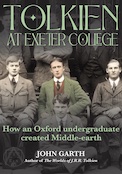Tolkien and the Great War
Reviewed by Nigel Jones
(author of Rupert Brooke: Life, Death and Myth)
in the Daily Mail
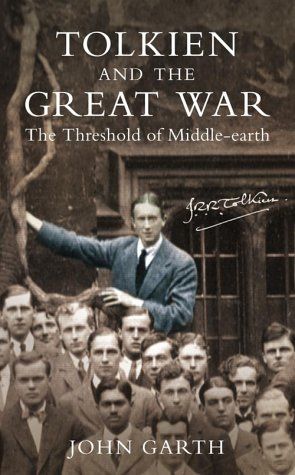 “This book is a labour of love in which journalist Garth combines a newsman’s nose for a good story with a scholar’s scrupulous attention to detail” “This book is a labour of love in which journalist Garth combines a newsman’s nose for a good story with a scholar’s scrupulous attention to detail” |
The Hobbit, the children’s story J.R.R. Tolkien wrote as a prelude to his masterpiece The Lord Of The Rings, famously begins: ‘In a hole in the ground there lived a hobbit.’ This book focuses on a crucial area of Tolkien’s life curiously skated over by previous biographers: the brief but searing time the creator of the hobbits spent in a hole - the trenches of World War I - and its lifelong influence on his epochal work.
It is also the story of the original Fellowship Of The Ring - the Tea Club and Barrovian Society or T.C.B.S. - a small coterie of friends Tolkien formed at King Edward’s School, Birmingham, who marched with him into the wilderness of the Western Front, and two of whose members died on the Somme, the savage battle which Tolkien survived, in body, but, as Garth shows, with his spirit indelibly scarred.
Throughout, Tolkien remains a man of mystery: austere, cold, reserved; hiding his emotions and his motivations behind layers of the elaborate mystic mythology he created, what John Garth calls his ‘legendarium’.
Orphaned early, Tolkien, while still at Oxford, plunged into the remote world of elves and fairies, goblins, gnomes and orcs which he made his own (though he dropped the gnomes in the Thirties when they became popular as garden ornaments).
He greedily feasted on ancient Anglo-Saxon epics, studying Finnish and Icelandic, and even inventing languages of his own to express his complex mythology of a titanic struggle between cosmic forces of good and evil.
The no less terrible 20th-century world caught up with Tolkien in 1914 with the outbreak of war, though with typical caution he waited for a year, until he had married and secured his academic future, before joining up as a signaller.
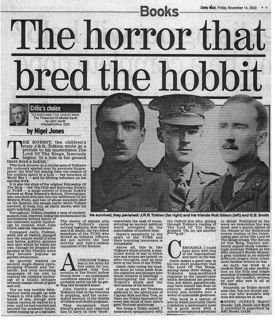 The choice of signals also reflects Tolkien’s canny survival instincts: Rob Gilson and G.B. Smith, the two fellow members of the TCBS who served as infantry officers, did not survive the four months and half-a-million casualties of the Somme.
The choice of signals also reflects Tolkien’s canny survival instincts: Rob Gilson and G.B. Smith, the two fellow members of the TCBS who served as infantry officers, did not survive the four months and half-a-million casualties of the Somme.
Tolkien was in the Army for four years, he, too, spent only four months at the Front before trench fever - an unpleasant condition spread by lice - probably saved his life by getting him invalided home.
John Garth’s account of Tolkien’s time in the trenches is gripping, and his understated account of the deaths of Gilson and Smith poignant.
They recognised their friend’s genius and expected him to carry on their ‘work’: essentially the task of reconstituting an ancient spiritual world corrupted by the materialism of modern time.
Garth’s sensitivity to the spirit of the T.C.B.S. and their touching innocence is remarkable.
Above all, this is, like Tolkien’s whole oeuvre, a masculine world of war in which love and women are tacked-on afterthoughts, just as they were in the lives of the TCBS.
Garth risks losing his readers when he turns aside from the narrative and plunges into dense thickets of philology - investigating the roots of Tolkien’s words and the derivations of his heroes.
Just as there are Trekkies addicted to the adventures of Captain Kirk and Star Trek, so there are Tolkies fascinated by every last detail of their hero’s grim Teutonic mythology.
| “Garth’s brilliantly argued study convincingly portrays Tolkien as the 20th century’s Nordic Homer; a grim colossus in an entirely different league from other, more familiar writers on war” |
Not being a Tolkie myself, I sometimes sympathised with the Oxford don who, sitting through Tolkien’s reading of The Lord Of The Rings, groaned: ‘Oh, no, not another f*****g elf.’ could have done with less of the ‘legendarium’ and more on the war.
Garth makes a good case in his too short postscript that The Lord Of The Rings, among many other things, is Tolkien’s long-meditated response to the catastrophe which decimated his generation, but which, paradoxically, may have turned him from an obscure academic whose hobby was hobbits into a writer of undeniable greatness.
This book is a labour of love in which journalist Garth combines a newsman’s nose for a good story with a scholar’s scrupulous attention to detail.
Published in the week we remember the war dead, and a month ahead of the release of the Hollywood screen version of the culminating part of the The Lord Of The Rings trilogy, The Return Of The King, Garth’s brilliantly argued study convincingly portrays Tolkien as the 20th century’s Nordic Homer; a grim colossus in an entirely different league from other, more familiar writers on war.
As such, his work is a modern Iliad: an epic meditation on the folly and tragic grandeur of mankind’s endless capacity for conflict, written by one who saw it all at first hand.
Naturally, no Tolkie should miss this, but nor should anyone else who wonders why men will always be at war.
© Daily Mail. Reproduced with permission.
First published 14 November 2003, as “The horror that bred the hobbit”.
The Worlds of
J.R.R. Tolkien
UK hardback
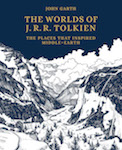
US hardback

To buy in French, Russian, Czech, Spanish, Italian, Finnish, Hungarian, German, or another language
see links here
Buy
Tolkien and
the Great War
UK paperback/ebook
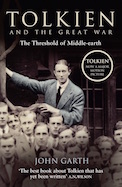
US paperback/ebook
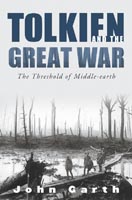
Audiobook read by
John Garth
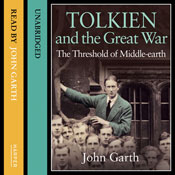
Amazon UK, Audible UK,
Audible US
To buy in Italian, German, French, Spanish or Polish,
see links here
Buy
Tolkien at
Exeter College
